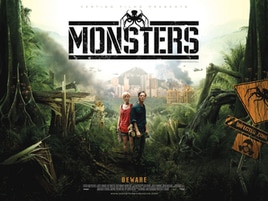 Upstream Color (2013). Shane Carruth's follow-up to his dizzying Primer (2004) will baffle more people than it will excite. It's an experimental movie, and thus frustrates the casual viewer. That doesn't make it any less interesting than Carruth's first justifiably famous effort. Here he follows a pair of individuals bound together because of a shared experience, examining them as they try to piece their lives together. Strange and at time too obtuse, it remains heartfelt and arresting. Spring (2014). In Spring, a grieving young man runs off to Italy, where he falls in love with a mysterious woman. As their relationship develops, she attempts to keep secret her true nature. The surprising thing about Spring is how it shifts gears from a slow-burn horror movie to science fiction love story. Beautifully shot, and with a powerful lead in Nadia Hilker, it resembles a story that might have been written by Lucius Shepard were he in a very good mood. (Review here.) Time Lapse (2014). A trio finds a camera that can take pictures of future events, and they begin to use it to their advantage. I'm never fully convinced that science fiction and film noir merge well together (with one or two obvious exceptions) but Time Lapse uses its fantastic elements to weave a tale of paranoia and fate that shouldn't be missed. Embers (2015). Lyrical and haunting, Embers follows several people in a world where almost everyone has lost their memory, and one young woman who retains hers. This premiered at Other Worlds Austin and remains one of my favorite science fiction movies, illuminating the fragility of identity and the bonds we share with others. Polder (2015). Another Other Worlds Austin entry, but replace the words "lyrical and haunting" with "batshit insane." (You know you're in for a wild ride when your pretitle sequence includes a quote from John Clute.) Polder is a movie that breaks down reality with a sledgehammer, pulverizing it into powder and leaving its audience to make sense of it. It's somewhat reminiscent of Cronenberg's eXistenZ, only far stranger. Midnight Special (2016). A young boy possesses unusual powers and becomes the focus of a manhunt by a religious order as well as the target of a federal investigation. Jeff Nichols focuses his otherworldly tale on fascinating, driven characters in a picture that has elements of Steven Spielberg in the 1980s, but with far more depth. Midnight Special works very well until the end, but the journey doesn't disappoint. (Review here.)
1 Comment
Leave a Reply. |
Derek Austin Johnson has lived most of his life in the Lone Star State. His work has appeared in The Horror Zine, Rayguns Over Texas!, Horror U.S.A.: Texas, Campfire Macabre, The Dread Machine, and Generation X-ed. His novel The Faith was published by Raven Tale Publishing in 2024.
He lives in Central Texas. Archives
May 2024
Categories |



 RSS Feed
RSS Feed